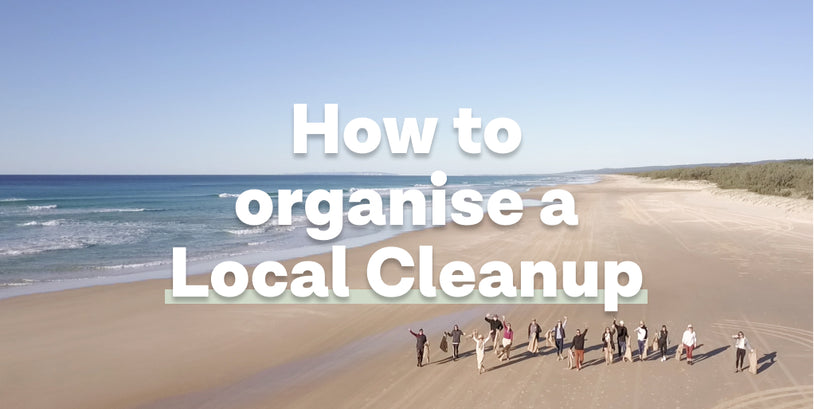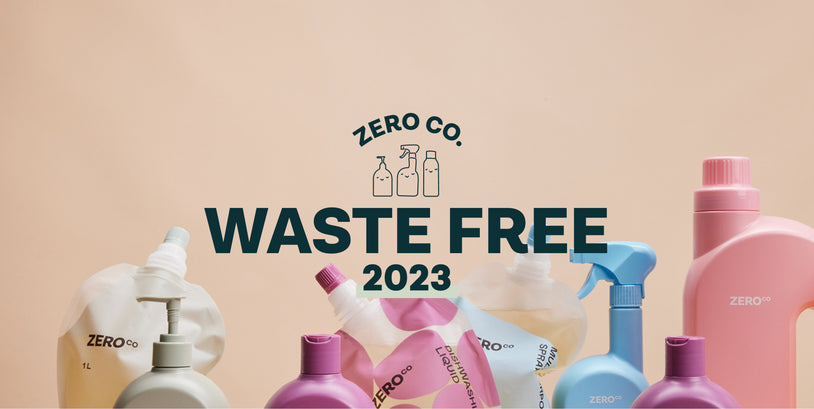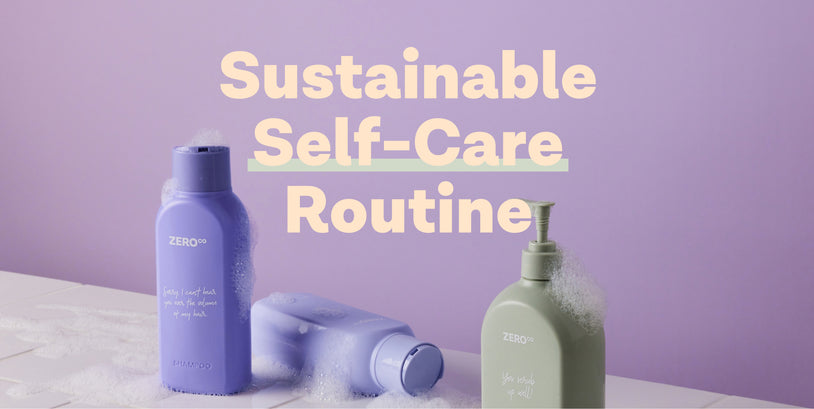When we first set out on our audacious journey to solve the global plastic problem (back in 2019) we had in mind a solution that would do two things:
- Pull plastic waste from the ocean, at scale, without requiring financial support from governments or charities.
- Create a truly closed-loop supply chain that would stop single-use plastic being produced in the first-place, cutting off its supply at its origin.
To bring this solution to life we developed a world-first supply chain that involves Forever Bottles (made from 50% recycled and ocean plastic) that you keep at your house and refill forever using pouches (made from recycled plastic diverted from landfill) that you send back to us to get cleaned and refilled.

When we were developing our solution we searched far and wide for local suppliers who could help us bring our vision to life. We were lucky enough to meet a local Aussie team who agreed to join us on our audacious journey and work with us on what we believe to be a world-first solution to creating a reusable pouch made from recycled materials diverted from landfill.
Whilst we were very fortunate to find a local partner to help with our reusable pouches, we were unable to find a single local bottle manufacturer or recycling business who was willing to work with us to figure out how to process ocean plastic and turn it into reusable packaging here is Oz. So we turned our attention overseas and a company based in Denmark.
At the time, this particular Danish supplier was engaged in a project called Ocean Waste Plastic which involved pulling plastic from the Java Sea, off the coast of Indonesia, processing that plastic and turning it into packaging. We went to Jakarta in the days before COVID19 and conducted a thorough audit of their supply chain. We met the local fishermen (and their families) who were doing the heroic work of cleaning our oceans. We went out on their fishing boats and did an ocean cleanup. We went to the local plastic recycling facility to see where the plastic was being processed. In the spirit of radical transparency we documented this entire journey and published it on the internet. You can see it again here:
Following our supply chain audit, we engaged this company to remove 6,000kgs of plastic from the Java Sea, equivalent to approx 500,000 water bottles worth of plastic. They were engaged to process that plastic and turn it into our first generation Forever Bottles, made from at least 50% ocean plastic. That was the agreement we had in place with them at the time and we were provided with assurances from them that this was possible.
Based on this assurance, Zero Co has been communicating publicly that our Forever Bottles are made from "ocean waste plastic", "OWP" or "ocean, beach & landfill bound waste" (and/or a combination of these statements). We have been very vigilant in ensuring that our communication has not, and does not, include statements claiming our Forever Bottles are made from 100% ocean waste (as some of the same suppliers customers have been doing).
There is one exception, which is this statement made in the FAQ section of our Kickstarter campaign from October 2019:

At the time that this statement was made (Oct 2019) it was true and accurate based on the information we had been given by our supply chain partner. A few months after the conclusion of the Kickstarter project (following our trip to Indonesia) we found that achieving 100% ocean plastic was not possible. Unfortunately Kickstarter does not allow campaigns to be edited or changed once they have been completed and as such we have not and will not be able to amend this one piece of communication about our bottles being made from 100% ocean plastic. We apologise for any confusion this one small piece of communication may have caused and may continue to cause (for anyone visiting our Kickstarter campaign page from 2yrs ago).
We'd like to be very clear here - from the moment we found out that making our bottles from 100% ocean plastic was not possible, we have not made such claims.
A few months ago it was brought to our attention that our Danish supplier was having difficulties within their supply chain, specifically around the tracking of ocean plastic from the recycling facility through to the manufacturing of our bottles. In short they were struggling to provide documentation and guarantees to prove that our bottles were being made from at least 50% ocean plastic, which is what had been agreed between us and them.
What does that mean?
It means that our Danish supplier were unable to provide us with a certificate, independently audited, to prove that our first generation bottles contained at least 50% ocean plastic, again as our agreement and invoices to them stipulated.
Does that mean that our first generation bottles contain no ocean plastic?
No it doesn't. But it does mean that we cannot say with 100% certainty that they contain at least 50% ocean plastic. The honest reality is that neither the supplier nor Zero Co know the exact percentage of ocean plastic in our first generation Forever Bottles. It could be 50%. It could be 49%. It could be 3%. We do not know.
As a result of this breakdown in transparency we have made the decision to cease our relationship with this Danish supplier until such point in time when they have the systems and auditing processes in place to provide 100% guarantees as to the level of ocean plastics being used in the packaging they produce. We wish them the best of luck on the journey they are undertaking to provide deeper transparency into their manufacturing process. The work they are doing, pulling plastic from the ocean and processing it back into a commercially viable commodity is incredibly important work. It's also incredibly challenging, especially during the COVID19 era where international travel has ground to a halt and their ability to audit external supply chains in Asia has become virtually impossible.
So where to from here?
We've spent the past 6 months hustling our little butts off trying to build our own supply chain here in Australia, from the ground up. Rather than throw up our hands and say "it's too hard" to solve the ocean waste problem, we have redoubled our efforts. We're incredibly proud to say that we are on the precipice of becoming the first company in Australia to pull plastic waste from Aussie oceans and beaches, recycle that plastic here in Australia and turn it into reusable packaging, manufactured here in Australia.
Over the past few months we've been collaborating with legendary not-for-profit organisations like Ocean Crusaders and Parley to collect plastic from Aussie oceans and beaches. We even set a world record in collaboration with Dean Cropp for the world's longest solo underwater ocean cleanup, spending 24hrs cleaning the bottom of Sydney Harbour. You can see that epic cleanup here:
All of the plastic we collected from the bottom of Sydney Harbour has been combined with plastic collected from Fraser Island by Ocean Crusaders and from the Great Barrier Reef by Parley. That mix of plastic from 3 separate ocean cleanups has been combined and sent to our new local recycling partner to be processed.
We are going to continue collaborating with local not-for-profit partners as well as curating our own ocean cleanups in the weeks, months and years ahead. Our commitment to cleaning the ocean remains unchanged.
The plastic we (and our local partners) collect will be recycled here in Australia and combined with landfill-bound waste to create what we are calling OBL - Ocean, Beach and Landfill bound plastic.
Did you know that 85% of the plastic that goes into curbside recycling (your yellow bin) actually ends up in landfill instead of being recycled? That's just one of the scary facts released in the Federal Government's Waste Report which you can download here (if you're into that kind of thing).
We're trying to reduce the amount of plastic headed to landfill by combining our ocean and beach plastic with curbside recycling to create OBL, which will then be used to make our new generation Forever Bottles right here in Australia.
It's still early days for this ambitious project, but here is what we can report today:
- We've started doing ocean cleanups here in Australia, both ourselves and in collaboration with not-for-profit partners.
- We've secured a local recycling partner that has agreed to work with us to process Australian ocean and beach plastic and combine it with landfill-bound plastic to create OBL.
- We've found a local bottle manufacturer willing to work with us to make our new generation Forever Bottles from OBL.
We recently did an audit of our new supply chain partners and once more in the interests of radical transparency we documented that process and are sharing it with the world here:
Our immediate goal is to produce our Forever Bottles here in Australia from 50% OBL. Tests are literally underway as we write this blog post and initial results are looking very promising. The end goal is to get to a place where our Forever Bottles can be made in Australia from 100% Ocean, Beach & Landfill (OBL) bound waste. When will we get there? We honestly don't know just yet. There are mountains of tests we need to run and countless mistakes we need to make before we get close to that audacious goal. But the journey has begun and we are fully committed to that big shiny destination of 100% OBL.
As with everything we've ever done at Zero Co we're going to keep you updated on every single move we make, every mistake, mishap, red-herring and out-right-failure. That's what being radically transparent means to us. It means sharing your failures as well as your successes. It means being open and honest and admitting when you (and your partners) make mistakes.
We hope this blog post has been informative and provided you with every possible piece of information you could possibly want to know about the ever evolving supply chain we're building at Zero Co to tackle the global plastic problem. If there's something we've missed or if there's extra detail you'd like from us, please reach out via hello@zeroco.com.au
That's all for now folks, onwards and upwards on the journey to solve the global plastic problem.
Cheers,
Mike & The Zero Co Gang













.jpg?v=1649893142)
-copy.jpg?v=1649890428)
